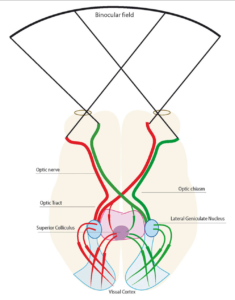What is Binocular Vision Dysfunction (BVD)?
Before discussing BVD, it is important to understand what binocular vision is. Bi- means both and -ocular means eyes, so binocular vision means seeing with both eyes. In their post about binocular vision, Vivid Vision¹ discusses how the brain receives separate signals from both eyes, and combines them together in order to see. We can generally coordinate our eye movements when both eyes are well-functioning. Additionally, both eyes see slightly different visual fields, which is why we have depth perception. When the eyes are functioning well this all works seamlessly, but when the eyes do not properly align or team, a number of uncomfortable symptoms can occur.
According to the Dizziness and Headache Optometry Center², binocular vision dysfunction is “…an ocular condition that occurs when the eyes don’t align properly with one another”. Symptoms of BVD result when our brain tries to correct or compensate for this misalignment, which can take a substantial amount of effort.

Types of BVD³
- Vertical Heterophoria
- A vertical misalignment of the eyes
- Esophoria or Exophoria
- Tendency for the eyes to drift inward (eso) or outward (exo) during certain tasks
- Convergence Insufficiency
- The inability to turn the eyes inward and keep single vision at a near point
- The #1 cause of eye strain
- Convergence excess
- Divergence excess
- Divergence insufficiency
Signs and Symptoms of BVD
- Double vision or blurred vision
- Fatigue when reading or doing computer work
- Poor balance or coordination
- Nausea or motion sickness
- Poor depth perception
- Pain in the eyes, neck, back, or face
- Head tilt
- Headaches or migraines with near work
- Anxiety in crowds or large spaces
- Restless sleep
- Difficulty with comprehension and attention
How Vision Therapy can help treat BVD
In his editorial piece “The Binocular Vision Dysfunction Pandemic”, Dominick M. Maino, OD, MEd, FAAO, FCOVD-A writes that “…Evidence based medicine has shown that the best and most efficacious treatment for convergence insufficiency (a type of binocular vision dysfunction) is office-based optometric vision therapy”. He describes how most other binocular vision dysfunction disorders would also benefit most from vision therapy.
Dr. Maino provided plenty of support for his findings through textbooks, case reports, studies, and other qualified individuals: “Dennis Levi, OD, PhD, Dean of the Optometry School at Berkeley, noted that perceptual learning (vision therapy) is a quite successful intervention if it is intensive, engaging and appropriately challenging”.
Those who have binocular vision issues due to brain injuries, autism, or other developmental, genetic, or intellectual disabilities can also greatly benefit from vision therapy.
If you suspect you or your child may have Binocular Vision Dysfunction, contact our office to schedule an appointment at
https://www.visualintegrationcenter.com/request-appointment/
Sources:
Vivid Vision
https://www.seevividly.com/info/Binocular_Vision
Dizziness and Headache https://www.dizzinessandheadache.com/blog/what-causes-binocular-vision-dysfunction.html#:~:text=Binocular%20vision%20dysfunction%20is%20an,are%20associated%20with%20the%20condition
https://www.dizzinessandheadache.com/binocular-vision-dysfunction.html
The Binocular Vision Dysfunction Pandemic
https://cdn.ymaws.com/www.covd.org/resource/resmgr/ovd41-1/editorial_binocularpandemic.pdf
